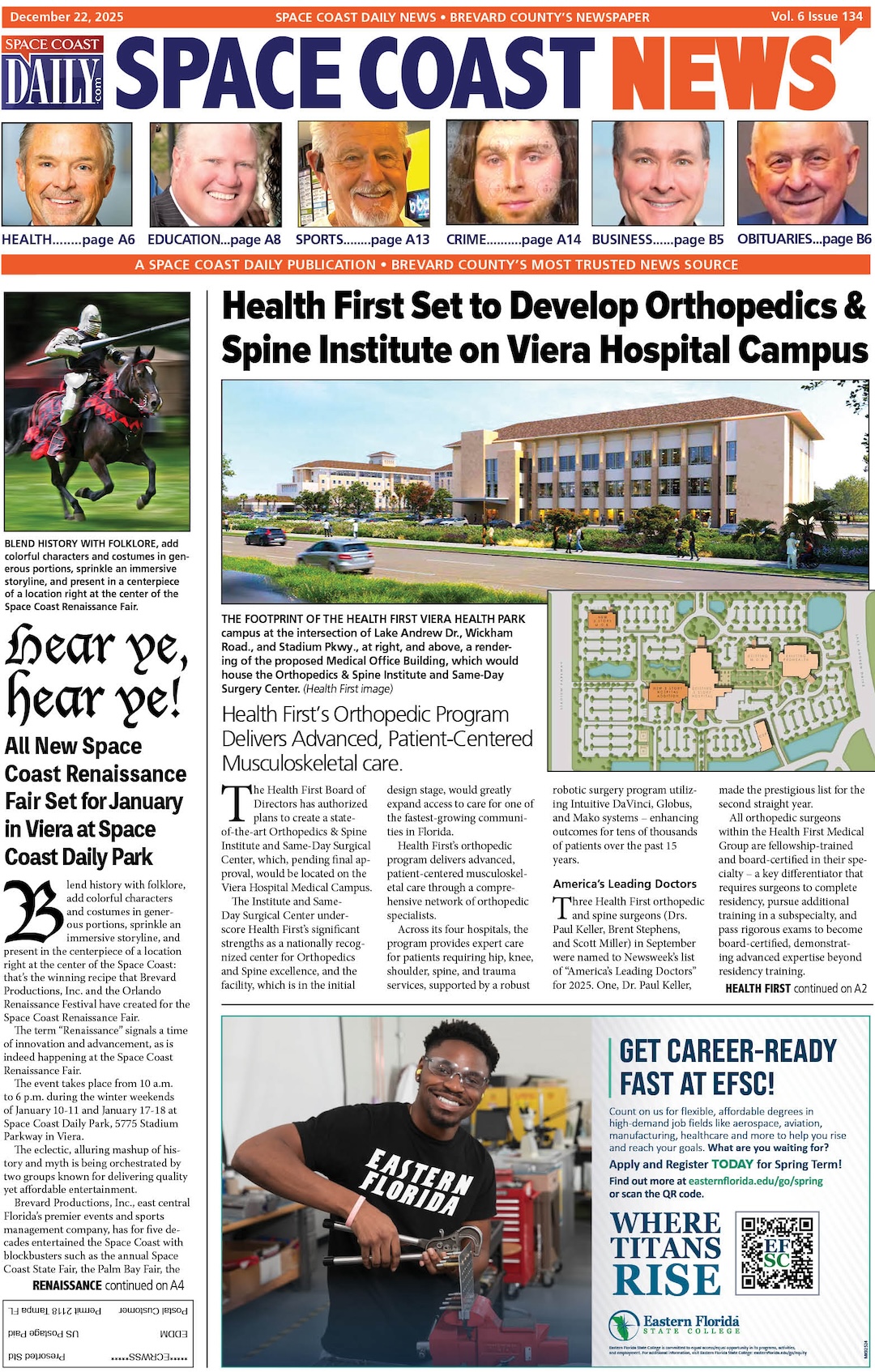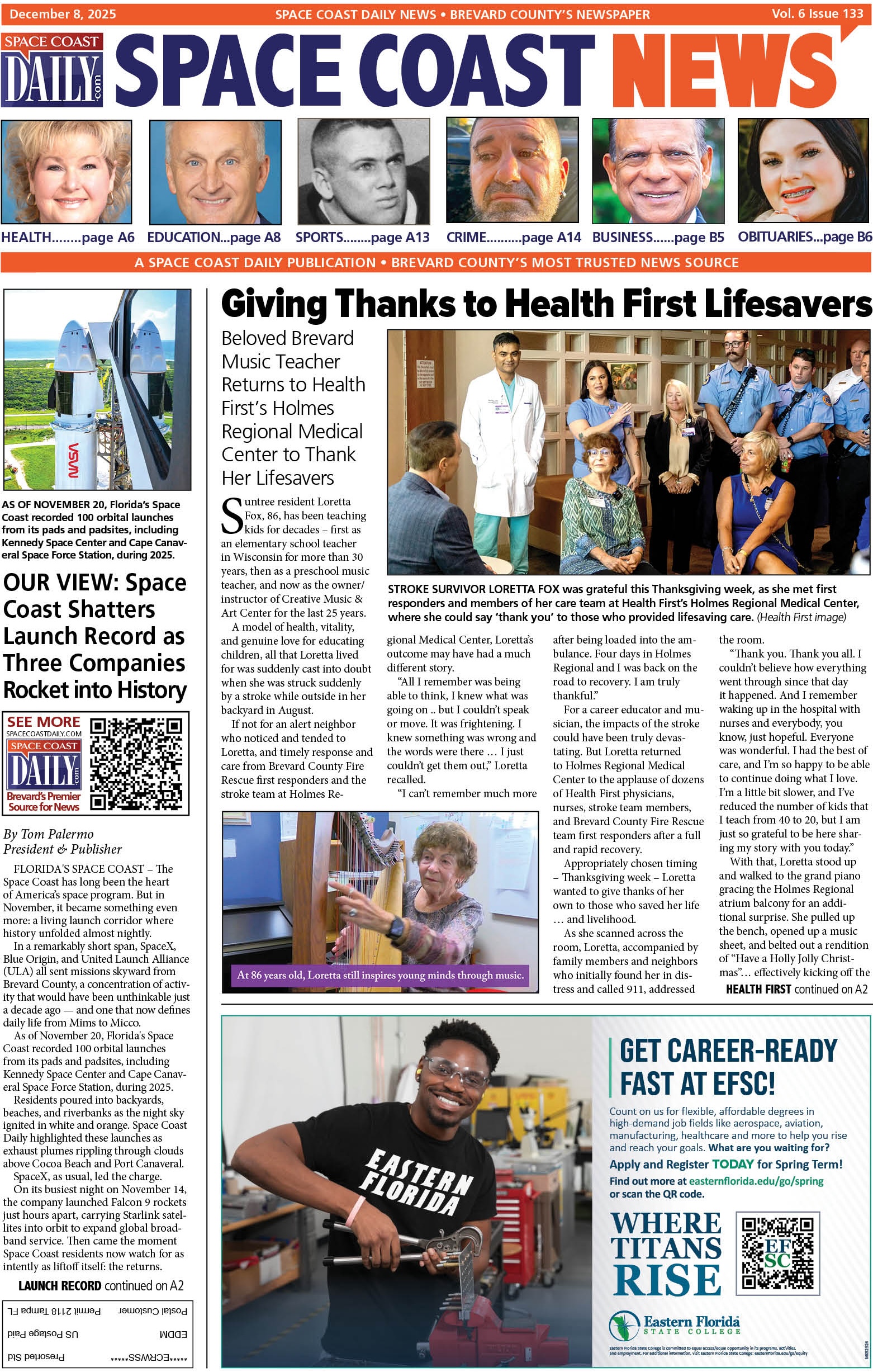Health First’s Breast Center is Where Women Go for Treatment, Sorority
By Space Coast Daily // October 15, 2024
there are more than 4 million women living with a history of breast cancer in America

Many staff at Health First’s Breast Center and Cancer Institutes are survivors themselves. They extend the kind of emotional care that can only come from a survivor.
BREVARD COUNTY, FLORIDA – The statistics are frightening. Lung cancer is the leading cancer killer in the U.S., but each year many more women are given a breast cancer diagnosis than all new lung cancer cases – about 30% of all cancer diagnoses in women are breast cancers.
Today, there are more than 4 million women living with a history of breast cancer in America. In 2024, about 311,000 women will be diagnosed with invasive breast cancer – and another 2,800 men will be, too.
Such a development carries a severe emotional toll on the patient and her family.
A year ago, Pam Haberman received a Stage II-III breast cancer diagnosis at the age of 37 that resulted in a bilateral mastectomy and months of chemo and radiation therapy.
“The day I was diagnosed, I will never forget this nurse in Dr. Amani’s office. As I was leaving, just devastated, she hugged me and said, ‘I’ve been through this. We will get you through this. You have the best team in your corner.’”
Then, this year, Haberman came across a job opening to be a Patient Services Representative at the practice of her Health First Breast Surgeon, Mustafa Amani, MD. The nurse Haberman remembers is Jodie Belloise, herself a two-time breast cancer survivor.
“Not many women are diagnosed at 37 years old with breast cancer,” Haberman says. “I took this [job opening] as an opportunity to do something not only for my mental health, but to help someone else about to go on a journey that’s very scary and totally unknown.”

A Sorority of Survivors
On a recent Friday, Haberman was greeted at the Breast Center at Health First Medical Group-Gateway by fellow Patient Services Representative Barb Kilfoy, nurse Kim Taylor and medical assistant Lisa Shuminsky.
Taylor and Shuminsky were diagnosed with breast cancer four and five years ago, respectively, on Valentine’s Day. (Shuminsky in August celebrated her five-year cancer-free mark.)
“It never gets easier,” Shuminsky told the others, remembering the fear and anxiety of it.
Taylor was a longtime nurse on the Mother and Baby unit at Health First’s Holmes Regional Medical Center, where Shuminsky was stationed right through the big double doors in Labor and Delivery. After their cancer diagnoses, they thought they could do more at the Breast Center under Surgeon Sharon Noori, MD.
“I left the hospital to come work here because of how great everyone is,” says Taylor, who even today continues to take aromatase inhibitors to lower the estrogen responsible for her particular breast cancer.
“I tell patients, knowledge is power. I’m a survivor – you’re going to be a survivor, too.”
Today, Taylor assists Dr. Noori with the breast biopsies done at the center. These biopsies often precede the worst news a person can get.
“I was sitting in this very chair,” Shuminsky tells the others. “I know the anxiety. I know the fear. I had a lady just tell me, ‘But you look so normal.’ I am! And you will be, too.”
But, says Kilfoy, a biopsy is not a diagnosis.
“I try to share with people, this biopsy itself is not a cancer diagnosis.”
Don’t let fear of the worst outcome set in, she says. Don’t skip the steps.

Words of Comfort, Words of Caution
“I now have the blessing of working here at the Breast Cancer,” she says, “and I enjoy explaining to our patients that I am a survivor and I look at it as a badge of honor.”
Each of the women have a message for every other woman who might come in.
For Taylor, it’s get your mammograms. She’s candid – she did not. Then, at 49, following a self-check, she found a lump and got her first one. “I was a bad example who tries to be a good example now.”
For Shuminsky, it’s that cancer and one’s cancer journey is as unique as the person fighting it.
“Your cancer is your cancer. Your treatment is your treatment. Your outcome is your outcome.”
“Cancer doesn’t discriminate,” says Haberman. “It can affect anyone you know, and likely, it has. Spread compassion – the world needs more compassion.”
“Every day is a gift. That’s why it’s the present,” says Kilfoy.
“Let October be a reminder, get your imaging done,” Shuminsky says. “Take care of yourself.”
To learn more about breast health and cancer prevention, including scheduling a mammogram or giving a five-step breast self-exam, visit HF.org/breasthealth.













